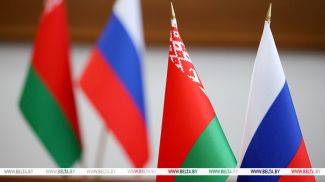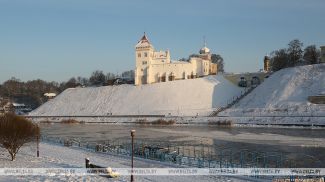MINSK, 3 December (BelTA) - Belarusian schoolchildren performed well in the Program for International Student Assessment PISA which was conducted in Belarus for the first time, Belarus Deputy Education Minister Aleksandr Kadlubai said during the presentation of the PISA study results in BelTA's press center.
“Belarus did well. Our students demonstrated a fairly high level in all three areas of the study. Their results are significantly higher than the global average,” Aleksandr Kadlubai said.
The Program for International Student Assessment PISA tested 15-year-old schoolchildren in Belarus in April-May of this year. The test materials were prepared in Russian and Belarusian. The test session consisted of a cognitive test that took 2 hours to complete and a questionnaire (35 minutes to complete). The study involved 236 educational institutions. They were selected by an uninterested organization from the United States (Westat). The testing was monitored by national and international observers.
PISA aims to measure how well 15 year-old students are performing in three areas – reading, mathematics and science, but the priority of the PISA-2018 was reading literacy. The main goal was to evaluate the practical skills of schoolchildren, the way they apply theoretical knowledge in life.
Belarusian schoolchildren performed well in reading literacy. Reading performance measures the capacity to understand, use and reflect on written texts in order to achieve goals, develop knowledge and potential, and participate in society. Belarusian schoolchildren scored 474 points to place between 35-36th positions in the world ranking, ahead of peers from Israel, Turkey, Slovakia, Greece, Ukraine, Kazakhstan and Moldova. The results of the Belarusian schoolchildren do not significantly differ from the results of their peers from Italy, Hungary, Lithuania, and are only 5 points lower than the results of peers from Russia (on a scale of 1000 points). The study showed that the higher the level of education of parents is, the better their children perform in reading literacy. Good results were demonstrated by children who entered pre-schools when they were 2-3 years old and those who started school at 5-6 years old. As in most countries of the world, girls in Belarus perform better when working with a text (finding information, understanding its meaning, evaluation and comprehension) than boys.
Mathematical performance measures the mathematical literacy of a 15 year-old to formulate, employ and interpret mathematics in a variety of contexts to describe, predict and explain phenomena, recognizing the role that mathematics plays in the world. “Belarusian schoolchildren fared well in most of the tasks, gaining 472 points (38th position in the world ranking), ahead of peers from Croatia, Israel, Ukraine, Romania, Moldova, Kazakhstan, and Bulgaria. Taking into account the statistical error, the result of our country is statistically comparable with the result of the United States and differs slightly from the results of Spain, Hungary and Lithuania," the deputy minister said. The study of mathematical literacy in Belarus has shown that its results are influenced by the desire of schoolchildren to get higher education; the availability of a good library at home is an advantage too. In this area, Belarusian boys performed better than girls
Scientific performance, for PISA, measures the scientific literacy of a 15 year-old in the use of scientific knowledge to identify questions, acquire new knowledge, explain scientific phenomena, and draw evidence-based conclusions about science-related issues. Belarusian schoolchildren scored 471 points (37th position in the world ranking), demonstrating a higher level of knowledge than their peers from Italy, Turkey, Ukraine, Kazakhstan and Bulgaria. Taking into account the statistical error, the results of Belarusian children differ slightly from the results of peers from Russia, Croatia, Iceland, and Luxembourg.
Thus, the Education Ministry positively assesses the performance of Belarusian schoolchildren. “It can be assumed (the experience of the Russian Federation is a testament) that in the future PISA-2021, taking into account thoughtful, balanced and verified measures to develop and improve the system of general secondary education, we will be able to achieve higher results in all areas.
However, the Education Ministry does not consider the work across the areas of PISA research as the key line of work. We face many other challenges. But since PISA is an element of recognizability of the national system in the world ranking, we believe that we need to work on this too,” the Education Ministry stressed. Belarus is now promoting the competency-based approach in education. It is about the assimilation of knowledge and the use of skills to meet real-life challenges. This trend is expected to be reflected in the revised Education Code.
The Program for International Student Assessment PISA is a worldwide study by the Organization for Economic Co-operation and Development (OECD) in member and non-member nations intended to evaluate educational systems. PISA studies have been conducted every three years since 2000. A total of 79 countries and administrative and economic territories participated in the study in 2018.













